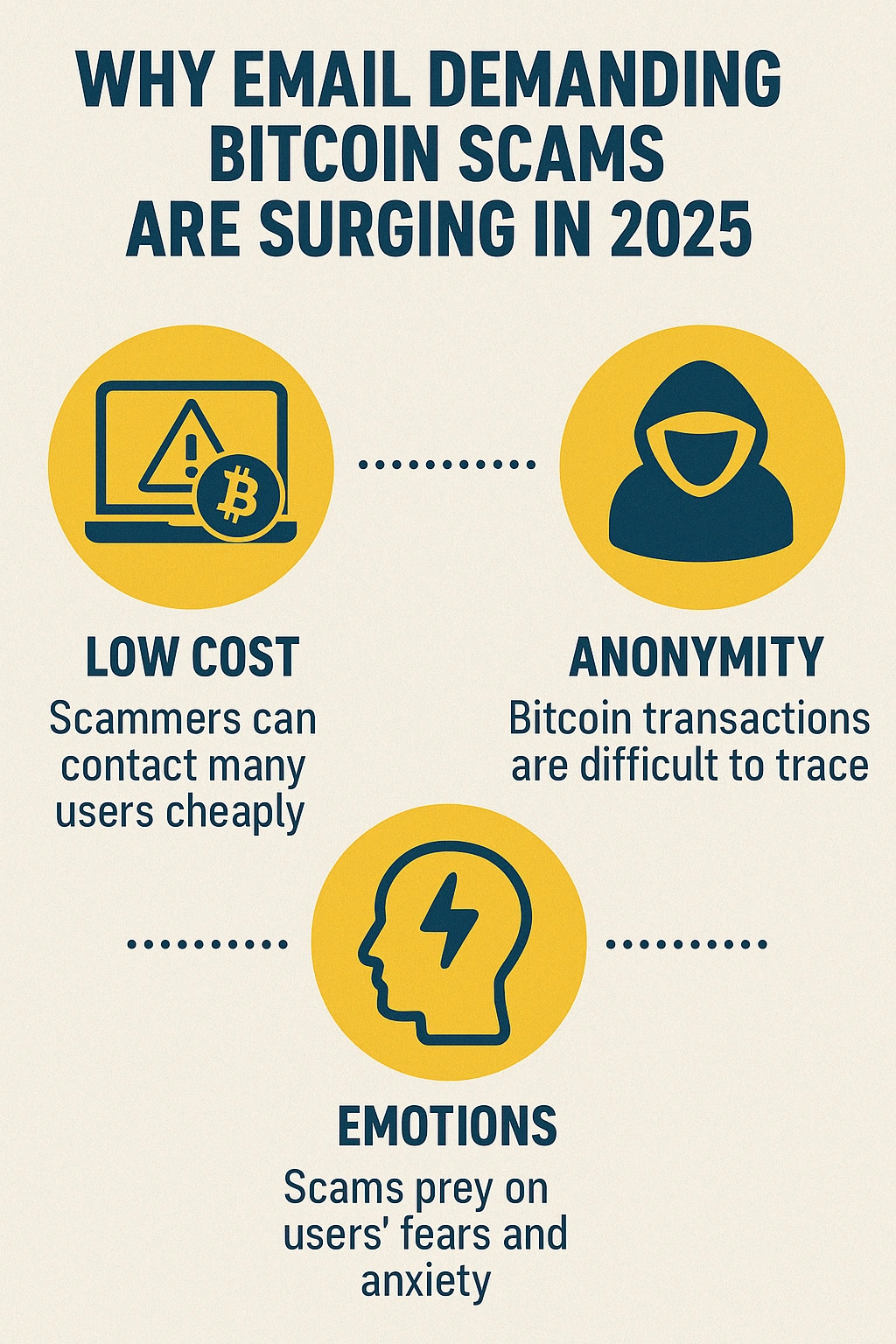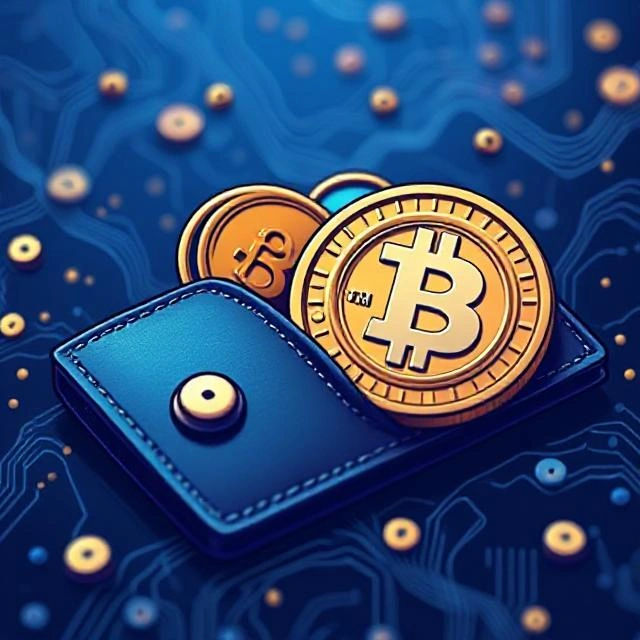Introduction to Email Demanding Bitcoin Scams
Have you ever received a terrifying email demanding that you pay a certain amount of Bitcoin? These emails are a form of digital extortion, where a scammer tries to scare you into sending them money. They often claim to have compromising photos or videos of you, or to have hacked your computer and stolen your personal data. These types of scams are also known as sextortion or blackmail scams. The criminals use fear and urgency to pressure you into paying quickly without thinking.

Why Email Demanding Bitcoin Scams Are Surging in 2025
Unfortunately, these types of scams are becoming more common in 2025. There are a few key reasons for this.
Rise of Cryptocurrency Extortion Emails
Cryptocurrency, especially Bitcoin, is a favorite for scammers. Why? It's decentralized and a lot harder to trace than traditional bank transfers. Once a Bitcoin transaction is made, it's pretty much irreversible. This makes it a perfect tool for criminals who want to get paid without getting caught.
Impact of AI and Automation in Scam Emails
Today, scammers are using advanced technology to make their tricks even more convincing. They're using **AI and automation** to write better, more personalized emails. This means they can send out millions of emails at once, and some of them will be so well-written that they'll bypass your email's spam filters. It's getting harder to spot a fake email just by looking for bad spelling or grammar.
How These Bitcoin Email Scams Work
The basic process for these scams is pretty simple, but it's designed to make you panic.
Typical Threats in Extortion Emails
The emails usually contain a threat. The most common one is a claim that the scammer has hacked your webcam and recorded you doing something embarrassing or inappropriate. They might also say they've stolen your passwords and private files. The email will then demand a payment in Bitcoin to prevent them from releasing this "private data" to your family, friends, and colleagues.
Social Engineering & Fear Tactics
Scammers are experts at **social engineering**. They use psychological tricks to get you to do what they want. They might include one of your old passwords in the email to make their story seem more real. This small detail is often enough to convince a person that the threat is legitimate. They also use fear and urgency, giving you a short deadline to pay up, which prevents you from taking time to think things through or ask for help.

Real Examples of Email Demanding Bitcoin in 2025
Case Study: Business Email Compromise
In a Business Email Compromise (BEC) scam, a hacker might pretend to be a senior executive and send an email to an employee demanding an urgent Bitcoin payment. The email will look like it's from the boss and will use a fake sense of urgency to trick the employee into making a payment without a second thought. Businesses can lose huge amounts of money this way.
Case Study: Individual Targeted Attacks
A common individual scam is when a scammer sends a Bitcoin extortion email to a person's personal email. They'll often claim to have sensitive information and will use the person's name, city, or other details they found online to make the email feel real. The goal is to scare the person so much that they pay to make the problem go away.
Warning Signs of Bitcoin Extortion Emails
There are some clear signs that an email is a scam.
Red Flags to Watch Out For
If you get an email like this, look for these **red flags**: The email uses generic threats, it asks for payment in untraceable currency like Bitcoin, it has a very short deadline, and it says something like "I've installed malware on my computer." These are usually just empty threats.
Common Subject Lines & Phrases
Scammers use common phrases to get your attention. Look out for subject lines like: "I Know What You Did," "Your Account Has Been Hacked," or "Bitcoin Payment Required." The body of the email will often include phrases like "I have access to all your devices" or "if you don't pay, I'll release the video."
Consequences of Falling for Bitcoin Email Scams
Financial Losses
The most immediate consequence is losing your money. If you pay the Bitcoin ransom, you will most likely never see that money again. There's no guarantee the scammer will keep their promise, and they often won't. You'll just be out the money and still at risk.
Identity Theft & Data Breaches
Paying the ransom can also mark you as an easy target for future scams. The scammers will know you are willing to pay, and they might come back for more. In some cases, a scam could lead to identity theft if they manage to get enough personal information from you.
How to Protect Yourself from Email Demanding Bitcoin Scams
The best way to deal with these emails is to not engage with them at all.
Technical Safeguards (Spam Filters, Security Tools)
Use strong spam filters and keep your antivirus software up-to-date. These tools can help block most of these scam emails before they even get to your inbox. You should also use unique, complex passwords for all your accounts and use two-factor authentication whenever possible.
Behavioral Practices (Don’t Click, Don’t Pay)
The most important rule is simple: **don't click on any links and don't pay the ransom.** The threats are almost always fake. Deleting the email is the best course of action. If you're worried about an old password they included, simply change it on that specific account.
Legal & Reporting Measures
If you receive a scam email, you should report it to your local law enforcement or cybersecurity agency. Reporting helps them track these criminal activities and protects others from falling victim.

Role of Governments & Cybersecurity Agencies in 2025
Governments and agencies are working together to fight crypto crime. They are trying to trace Bitcoin transactions, even though it's difficult, and are working with international partners to catch these scammers. However, these efforts are often slow and complex, so personal awareness is still your best defense.
Future of Bitcoin Scams Beyond 2025
As technology evolves, so do scams.
AI-Powered Phishing
In the future, scammers will likely use more advanced AI to create even more convincing emails and phishing websites that are almost impossible to distinguish from the real thing.
Deepfake Extortion Scams
We might even see **deepfake extortion scams**, where criminals use AI to create fake videos or audio of you to make their threats seem real. These kinds of scams are still rare but are a growing concern.
Expert Tips to Stay Safe in 2025
- Educate yourself: Learn about common scams and how they work.
- Be skeptical: If an email sounds too good to be true or too scary to be real, it's probably a scam.
- Use strong security: Use a password manager, 2FA, and keep all your software updated.
- Never send crypto to an unknown address.
- Never click on suspicious links or download attachments.
FAQs about Email Demanding Bitcoin 2025
What should I do if I receive a Bitcoin demand email?
Don't panic. Don't reply, and don't pay. Simply delete the email and block the sender. Report it to the appropriate authorities if you feel it's necessary.
Are these Bitcoin extortion emails real?
In almost all cases, no. The threats are empty, and the scammer does not have any of your data. They are just trying to scare you into paying.
Can scammers hack my computer with just an email?
Just opening an email usually can't harm your computer. The danger comes from clicking on links or downloading attachments. As long as you don't interact with the email, you're safe.
Should I pay if they threaten to release private data?
No. Paying is a mistake. It proves to the scammer that you are willing to pay, and there is no guarantee that they will stop. They will likely come back with more demands. It is always best to ignore the threat.
How do I report Bitcoin scam emails in 2025?
You can report them to your local police, the FTC (Federal Trade Commission), or the FBI's Internet Crime Complaint Center (IC3).
Is cryptocurrency making scams harder to track?
Yes, its decentralized nature makes it harder to trace, which is why scammers love it. However, law enforcement agencies are developing new methods to track these transactions.
Conclusion: Stay Alert Against Email Demanding Bitcoin 2025
Bitcoin extortion emails are a scary reality in the digital world. But by understanding how they work and knowing the warning signs, you can protect yourself. Remember, the key is to stay calm, don't pay, and delete the email. Your digital safety depends on your awareness and a little bit of common sense. Always be on the lookout for suspicious emails and trust your gut feeling. Don't let fear win.